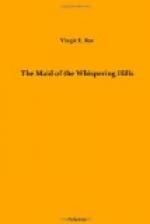They drew a line upon the earth as they had done before, squabbling over its distance from the painted post; Bois-Brules, their keen eyes gleaming, haggling for a greater stretch, and presently Maren stood upon that line and they had pressed into her hand a bright new hatchet, one of those bought from McElroy himself in the first days of trading.
Then an Indian, naked and painted like a fiend, whose toes turned out, stepped forth and spoke in good English.
“Woman Who Follows,” he said distinctly, “one of these two dogs is a murderer,—having killed the Great Chief when his people came in peace to trade at the Fort. Therefore, one of them must die. The Nakonkirhirinons take a skin for a skin,—not two skins for one. So did the Great Chief teach his people. But none know which hand is red with his blood. For two sleeps and a sun have the braves given them the tests,—the Test of the Flying Knives, the Test of the Pine Splinters, the Test of the Little Lines, but neither has shown Colour of the Dog’s Blood. Therefore, justice waits. Now has Wiskend-jac, the Great Spirit, sent the White Doe from the forest to decide. Throw, White Woman, and where the tomahawk strikes shall Death sit. Hi-a-wo!”
The renegade stepped back and a silence like death itself fell upon the assembly.
Then did the colour drain out of the soft cheeks under the berry stain and the girl from Grand Portage stand fingering the bright hatchet in her hand. Her eyes went to McElroy’s face and then to that of the cavalier leaning forward between his swinging curls, and both men saw the shine that was like light behind black marble, so mystic was it and thrilling, beginning to flicker in them.
“Bravo!” cried De Courtenay, his brilliant face aglow with the splendid hazard. “Bravo! We are akin, Ma’amselle,—both venturers, and my blood leaps to your spirit! Throw, Sweetheart, throw! And may the gods of Chance guide your hand!”
“Think not of me, Maren!” cried McElroy, in deadly earnest. “You owe me naught! Throw for M’sieu, whose peril is my doing!”
For many moments she stood so, fingering the white handle of the weapon, and there was no sound in all the vast assemblage save the crackle of the flames. Then they saw her muscles tauten throughout her whole young body, saw her draw herself up to her full height, and again for a second’s space she stood still. In that moment she had deliberately put herself back in the surging turmoil of Grand Portage, was listening to the words of old Pierre Vernaise: “Well done, Little Maid! Again now! Into the cleft! Into the cleft! Ah-a! Little One, well done! Alas, but you beat your old teacher!”—was feeling again the surge of a childhood triumph which scorned to bring nearer that wilderness of her dreams.
With a swift motion her arm shot up and forward and the tomahawk left her hand, flying straight as an arrow for the target. It struck with a clean impact and stood, the handle a little raised and the point well set in the green wood. There was a rush of the medicine men, who seemed to act as judges, and then a silence. Peering, bending near to look closer, they gathered with confusion of voices and presently stepped back, that all might see.




